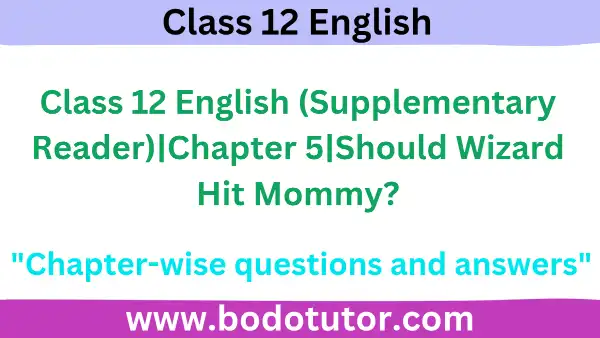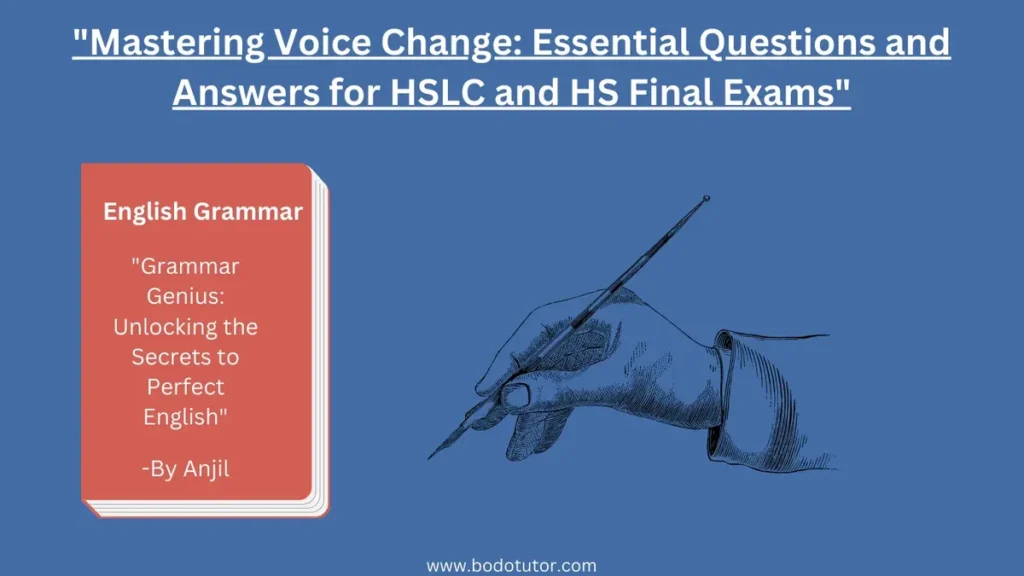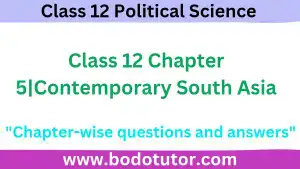Class 12 English (Supplementary Reader)|Chapter 5|Should Wizard Hit Mommy?: Welcome to bodotutor.com ! Here you will get complete Class 12 English notes based on the AHSEC|ASSEB syllabus. We are starting with Class 12 Chapter – 5: Should Wizard Hit Mommy?, and we’ll continue to provide clear, easy-to-understand notes for every chapter to help you in your exams. Stay connected for regular updates and more study materials!

Class 12 English (Supplementary Reader)|Chapter 5|Should Wizard Hit Mommy?
Answer the Following Questions:
1. Who is the narrator of the story?
Ans: Jack, Jo’s father, is the narrator.
2. What was Jack’s usual storytelling pattern?
Ans: A creature named Roger would have a problem, consult the owl, then the wizard, and return home happy.
3. Who was the main character in the story told this time?
Ans: Roger Skunk.
4. What problem did Roger Skunk face?
Ans: He smelled bad and no one played with him.
5. Who advised Roger Skunk to meet the wizard?
Ans: The wise old owl.
6. What smell did Roger choose after the wizard asked?
Ans: The smell of roses.
7. Why did Roger’s mother get angry?
Ans: Because Roger smelled different and she didn’t approve of the change.
8. What did Roger’s mother do to the wizard?
Ans: She hit the wizard with an umbrella.
9. What was Jo’s reaction to the ending?
Ans: She was upset and wanted the wizard to hit Roger’s mommy instead.
10. What does the story reveal about Jack’s personal struggles?
Ans: Jack struggles with parenting, storytelling fatigue, and emotional distance in marriage.
Fill in the Blanks:
1. Jack used to tell Jo a story out of his __________.
Ans: Head.
2. Roger Skunk wanted to smell like __________.
Ans: Roses.
3. The wise old owl lived at the __________ of the tree.
Ans: Tiptop.
4. The wizard asked for __________ pennies.
Ans: Seven.
5. Jo wanted the wizard to __________ Roger Skunk’s mommy.
Ans: Hit.
True or False
1. Jack loved telling stories to Jo every day.
Ans: False.
2. Roger Skunk was happy after smelling like roses.
Ans: True.
3. The wizard changed Roger back to his original smell.
Ans: True.
4. Jo agreed with the ending of the story.
Ans: False.
5. Clare was painting the living room while Jack told the story.
Ans: True.
Long Type Questions and Answers:
1. Why did Jack feel storytelling had become a burden for him?
Ans: Jack felt storytelling was exhausting, especially on Saturdays when Jo did not nap. He found it harder to come up with new variations of the same story and felt emotionally and mentally drained due to the repetitive ritual, responsibilities at home, and his own fatigue.
2. What is the significance of Roger Skunk’s transformation in the story?
Ans: Roger Skunk’s transformation from smelling bad to smelling like roses symbolizes a desire to conform and be accepted. It raises the moral question of whether one should change their identity for social approval or embrace their true self. It also brings out Jo’s view on acceptance and innocence.
3. How does Jo’s reaction reflect a child’s sense of justice?
Ans: Jo believes in fairness and sees the mother as unjust for reversing Roger’s happiness. Her wish that the wizard should hit the mommy shows her immature yet sincere sense of justice, prioritizing happiness and social acceptance over traditional parental authority.
4. How does the story reflect a conflict between generations?
Ans: The story shows a clash between the child’s worldview and the adult’s. Jo, representing innocence and modern values, wants Roger to smell good and be happy. Jack, representing traditional values, believes the mother knows best, emphasizing obedience and identity preservation.
5. Comment on Jack’s inner conflict throughout the story.
Ans: Jack is torn between upholding parental authority and acknowledging Jo’s new assertiveness. He also feels emotionally burdened by routine domestic life and struggles with his own childhood memories, feelings of isolation, and inability to connect with Clare.
6. What does the ending of the story signify?
Ans: The ending highlights unresolved tension—Jo is dissatisfied and Jack is weary. It shows how parents struggle to maintain control while children begin to form their own opinions. The ending suggests that the generational gap in values cannot be easily bridged.
7. How does the story show the reality vs. imagination conflict?
Ans: Jo blurs the lines between fiction and reality, asking questions like “Are magic spells real?” This phase reflects children’s development of logical thinking, contrasting with Jack’s intent to use fantasy for moral lessons. Their perspectives clash in interpreting the story.
8. What role does the character of the wizard play in the story?
Ans: The wizard symbolizes change and external help in achieving happiness. For Jo, he is a hero who makes Roger accepted. For Jack, he represents something to be controlled, which is why he allows the mother to overpower him and reverse the change.
9. Comment on the significance of the title “Should Wizard Hit Mommy?”
Ans: The title poses a moral dilemma reflective of Jo’s innocent but strong views on justice and happiness. She sees the mother as the villain who ruined Roger’s joy and believes the wizard should punish her. The question in the title challenges readers to consider perspectives of authority vs. individuality, obedience vs. freedom, and innocence vs. experience. It provokes thought about parenting, love, conformity, and the complexity of moral choices.
10. What theme does the story explore regarding parent-child relationships?
Ans: The story explores the growing tension between a parent’s desire to pass on traditional values and a child’s emerging sense of individual thought and justice. Jo’s disagreement with the story ending shows a child’s questioning attitude toward authority and moral decisions.
11. How does John Updike use storytelling as a metaphor in this piece?
Ans: Storytelling is used as a metaphor for parenting and the transfer of values. Jack tries to reinforce his beliefs through the story, but Jo’s interruptions and revisions reveal her developing identity. The act of storytelling becomes a battleground for control, values, and perspective.





